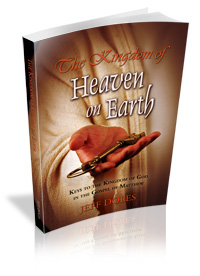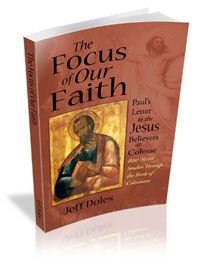Now whatever city or town you enter, inquire who in it is worthy, and stay there till you go out. And when you go into a household, greet it. If the household is worthy, let your peace come upon it. But if it is not worthy, let your peace return to you. And whoever will not receive you nor hear your words, when you depart from that house or city, shake off the dust from your feet. (Matthew 10:11-14)
Jesus sent the disciples out to preach the kingdom and manifest the signs of it, but He cautioned them that not everyone would receive it. There would be persecution ahead. Some would be hospitable to them and believe their message; others would reject it. Those who received would have a blessing of peace given to them; for those who turned away the message, and the messengers, there was no blessing to offer. We will see Jesus talk about this again in Matthew 25:31-45, where He speaks of the division of the sheep and the goats based on how they receive His disciples. The principle, implied here but much more explicit there, is found in Matthew 25:40, “Inasmuch as you did it to one of the least of these my brethren, you did it to Me.” (See Those Who Will Inherit the Kingdom)
“Behold, I send you out as sheep in the midst of wolves,” Jesus said, “Therefore, be wise as serpents and harmless as doves” (Matthew 10:16). They would need to have great prudence and be innocent of evil. He warned them that they would be brought up and accused before Jewish councils, and flogged in the synagogues (v. 17). They would be betrayed to Gentile governors and kings, but the Holy Spirit would show them what to say (vv. 18-20). They would be widely hated in Israel because of Jesus’ name, and persecuted from city to city for being His disciples. Just as their Master would be despised, so they would be, too. It would be a comfort to be in such good company as His (vv. 21-25).
“Therefore do not fear them. For there is nothing covered that will not be revealed, and hidden that will not be known” (v. 26). The true nature of things would be made manifest. What was now being revealed to them in secret, they would soon preach abroad (v. 27). Though men may put to death the body, they cannot touch the soul (v. 28). The God who takes care of the sparrows, which are of very little value in the marketplace, knows the number of hairs on our heads, because we are of far greater value to Him (vv. 29-31).
“Therefore whoever confesses Me before men, him I will also confess before My Father who is in heaven. But whoever denies Me before men, him I will also deny before My Father who is in heaven” (vv. 32-33). Here is the great dividing line: Whoever believes and confesses the gospel of Jesus Christ openly on earth will be acknowledged before God in heaven by the Lord Jesus. Whoever rejects Him on earth will be denied by Him in heaven. It is a sobering judgment, a sword that will even separate family members from one another. But if one chooses Jesus as King, he must love Him even more than father, mother, daughter and son (vv. 34-37).
All these things awaited the disciples as they fulfilled this great commission, and came to pass within a generation, after Jesus went to the Cross. His Cross became a cross each of us must bear (v. 38). It is the cost of following Jesus (was the scribe who promised to follow Him everywhere really ready for this?). It is the difference between losing life and finding it. “He who finds his life will lose it, and he who loses his life for My sake will find it” (v. 39).
Now Jesus returned again to the reward for those who receive the ministry of the disciples:
He who receives you receives Me, and he who receives Me receives Him who sent Me. He who receives a prophet in the name of a prophet shall receive a prophet's reward. And he who receives a righteous man in the name of a righteous man shall receive a righteous man's reward. And whoever gives one of these little ones only a cup of cold water in the name of a disciple, assuredly, I say to you, he shall by no means lose his reward. (Matthew 10:40-42)The kingdom of Heaven on Earth is a reward for those who believe the message of the gospel brought by the disciples. The cost for confessing the Lord Jesus may be great, but the cost for rejecting Him is infinitely greater.

The Kingdom of Heaven on Earth
Keys to the Kingdom of God
in the Gospel of Matthew
by Jeff Doles
Preview with Amazon’s “Look Inside.”
Available in paperback and Kindle (Amazon), epub (Google and iTunes) and PDF.

